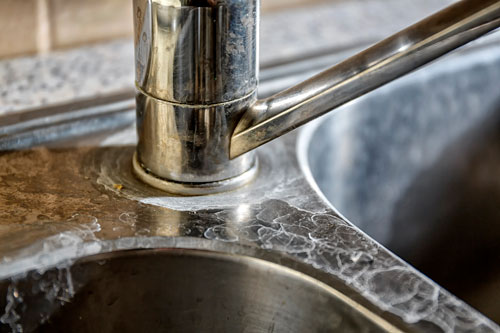What is Hard Water?
If you have hard water in your home, you may experience problems with your supply. As water is transported to your home, it can gather minerals along the way. Although this isn’t highly dangerous or hazardous to your health, it can cause unwanted complications in the long term. When you have hard water, minerals such as calcium and magnesium accumulate in your supply and cause many troublesome inconveniences with your pipes, appliances and fixtures. There are four water hardness levels you should know about:
- Soft Water – 0 to 60 mg/L
- Moderately Hard – 61 to 120 mg/L
- Hard – 121-180 mg/L
- Very Hard – 181+ mg/L
Ideally, you want to stay in the soft range. Our experts at Atlantic Blue Water Center are always on-hand to offer you guidance and solutions for navigating hard water in your home. You and your family deserve water that is safe to drink, and we want to ensure you’re happy with your water supply. However, it can be difficult to tell if you have hard water to begin with. Therefore, we’ve provided a few telltale signs for you below.
Signs You Have Hard Water
If you’re dealing with any of the following problems, call your local water experts ASAP. While these signs can indicate the presence of hard water in your home, another issue could be the cause. Rather than wait it out and deal with worsening problems, it is always better to get professional help. If you’d prefer, you can also check out our water solution center for a few instant suggestions.
-
- Bad-tasting or smelling water. When you go to take a drink of water, it shouldn’t taste strange. If you notice a dirty taste or a repellent smell, treatment may be required.
- Soap doesn’t lather well. Calcium and magnesium deposits in hard water can seep through your water supply and cause soap scum. Ultimately, you’ll be using additional soap when you bathe and wash dishes. Still, you may feel like your dishware isn’t getting clean. Your hair and skin may also feel dry or grimy.
- Clogged pipes. If you’re noticing that your pipes are becoming clogged more and more often, that is a chief sign of mineral build-up.
- Damage to appliances. Over time, hard water is tough on appliances like dishwashers and washing machines. You may find that they aren’t lasting as long as you’d like them to, and this can get pricey if repeated replacements are necessary.
- Accumulation on fixtures and dishware. Take a look at your toilet, bathtub and sinks. Can you see any reddish-brown stains? When you wash dishes, do you typically notice white spots and soap scum on your glasses? If you begin seeing this frequently, it may be time to call your local water specialists. They will be able to perform a water test and determine your exact needs.
- Stiff laundry after washing. With hard water, clothes can feel somewhat coarse, or like you didn’t wash them at all. Over time, you may also notice your clothes rip or tear easily.
- Water issues in your area. When there’s something wrong with your local water supply, word travels. If your neighbors are mentioning problems with hard water in their homes, there’s a good chance you might be dealing with the same problem.

What to Do About Hard Water
The last thing you want is for hard water to cause these concerns in your home. Luckily, however, this can be taken care of without much hassle. In most cases, hard water can be mitigated with the help of water softeners. Softeners work to:
- Extend the longevity of your appliances
- Brighten your clothes
- Give you smooth skin and healthy hair
- Eliminate scale and water spots
- Save you money on soap and detergent
- Provide great-tasting water
Water Testing with Atlantic Blue Water Center
We don’t recommend that you attempt to resolve this problem on your own. Only water specialists can perform a certified test to identify the cause of any difficulties with your supply. Our certified hard water testing will let you know what level of hardness is present in your water. In addition, we can perform lead testing, bacteria testing, VOC testing, MTBE testing, nitrates testing, pH testing and Radon testing. If we find any contaminants, we will then sit down with you to discuss the many affordable options available to you.
Learn More about Hard Water Solutions with Atlantic Blue Water Center
We provide water treatment and water softening solutions for homeowners that want a cleaner water supply and water that is free from hazardous carcinogens that can contribute to increased cancer risk. We’re also focused on providing additional education on water treatment, water quality, and issues associated with water contaminants. Call us at (410) 751-9200 to schedule your in-home water testing appointment today.
